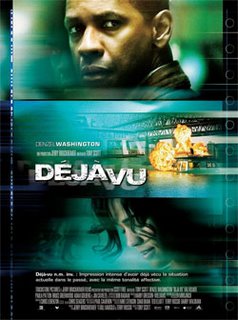Written at the time of the film's release..."The Braking of Pelham 4-5-6"
or
"So...Now What the Hell Do We Do?"
Tony Scott's last film was the very "meh" update of The Taking of Pelham 1-2-3 with Denzel Washington as a harried subway supervisor on the day that crazy terrorist John Travolta decides to take a train (and its passengers) hostage. The movie was hysterical in the "hair-on-fire" way (and not in the "ha-ha" way) where the earlier Joseph Sargent-directed version was cleverly funny, the film-makers leaching colors out of the picture and backing it with a hip-hop beat. It was a dull and lifeless movie with all sorts of editing tricks and false drama trying to make the thing seem more like an action movie than the material had the capacity to fulfill. So, what you got was a movie that felt like it was suffering from inappropriate 'roid-rage.
Perhaps they should have skipped Pelham and gone straight to Unstoppable (called that because, presumably, Andrey Konchalovskiy already made Runaway Train in 1985!). Based on the "Crazy 8's" incident in 2001, where an engineer-less train—train 777, making it, apparently, that much closer to "the Choo-Choo of the Beast"—carrying dangerous chemicals (the "molten phenol" used in the film), moved unimpeded and under power at speeds up to 48 mph, it has, like Pelham, been ginned up with drama and death and derring-do, and the inevitable "countdown to disaster" that could end Scranton, Pennsylvania as we know it."Hello, do you read?"
Everything that can go wrong can and does. The train is under power due to an operator error—he was under pressure from co-workers to move a heavily laden train quickly, and left the cab to try and move a track-switcher—with its brakes disconnected, on a collision course with another filled with school-kids on a "train-safety" field-trip (Oooooh, the irony!), but there seem to be enough Pennsylvanians on the track that you suspect it was "Go Stand on a Railroad Track Day" in the state (at least, the film-makers kept it free of nuns, widows, orphans and puppies—although one shot of a raccoon crossing the track with the train hurtling at us in the background provoked an inappropriate fit of the giggles). It's carrying the afore-mentioned molten phynol "used in the manufacture of glue"—and in case we don't get it (a problem with this movie) it is reiterated that it is "very toxic, highly volatile" and the place the train will most likely derail is in the middle of Scranton on a curve that overlooks (conveniently) a large collection of fuel oil storage tanks. Now, ladies and gentlemen, that is bad city planning."Yeah, I read. I CAN read. Are you talking about genre?"
On top of that, the corporate heads irresponsibly want to stop it in the least expensive way possible, meaning that it probably won't work, and the two engineers also on a collision course with "a missile the size of the Chrysler Building" consist of a bitter company vet and a kid on his first day on the job with a court appearance that he has to make.
This is one over-loaded train. Scott pulls out all the stops—he doesn't have any brakes, either—skip-and ramp-editing the train footage to move it faster, swooping around the trains to give everything more momentum, constantly changing perspective to keep one ill at ease (until the two Mutt and Jeff engineers—Denzel Washington and Chris Pine—share a laugh—and a frame—half-way through the film, their conversations consist of separate shots of each speaking their lines from opposite perspectives of the engine compartment), it is a busy, busy movie. Credit to Scott, he keeps you informed what's going on so you never get lost in the spinning images. If anything, there is too much information—needlessly identifying various locations at the beginning when they're all 200 miles of each other, and not trusting any piece of information to not be re-iterated (after a terse conversation with the corporate HQ, do we need to have the gal in charge (Rosario Dawson) call her callous supervisor "an asshole?"). The entire plot is summed up a couple times during the movie ("So, what you're telling me is....") to the point where you're feeling slightly talked down to. Still, it is a bit of a fun ride for all the lapses in passenger-service."What is this, a book-club? Stop the damn train!"
One funny aspect of the film is its constant thrusting of Fox News coverage of the event (the film is a 20th Century Fox release and both entities are holdings of News Corp.). But it may be a bit of a miscalculation: the circling news helicopters buzzing the train seem to not only distract, but also interfere with the rescue efforts, to the point where they're actually one of the things hampering the struggles of the people to resolve the situation. Fox runs the risk of making one of their own divisions look poor in their attempt to cross-promote, derailing their own efforts throughout the film.
















